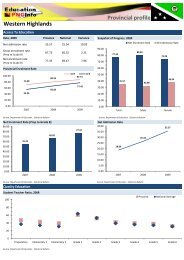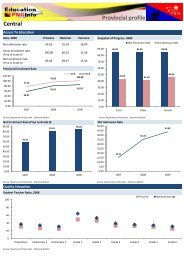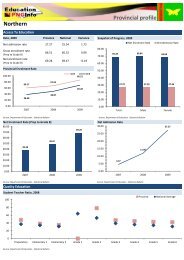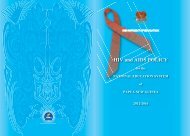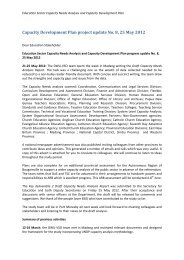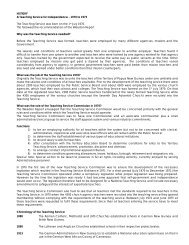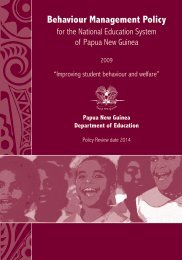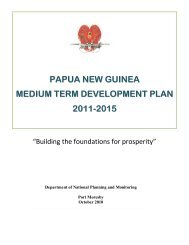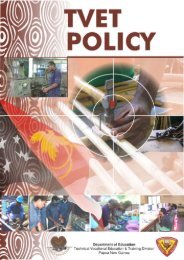HIV/AIDS Teacher Resource Book - Department of Education
HIV/AIDS Teacher Resource Book - Department of Education
HIV/AIDS Teacher Resource Book - Department of Education
- No tags were found...
Create successful ePaper yourself
Turn your PDF publications into a flip-book with our unique Google optimized e-Paper software.
It is safe to care for someone with <strong>AIDS</strong> – you will not get <strong>HIV</strong>.Caring for someone with <strong>AIDS</strong> can be stressful and exhausting because they willneed a lot <strong>of</strong> care as they near the end <strong>of</strong> their life.• The house and people in the house must be kept as clean as possible toprevent infections (<strong>AIDS</strong> patients have a weak immune system).• Wash your hands with soap and water before and after caring for a loved onewith <strong>AIDS</strong> to prevent other types <strong>of</strong> germs infecting them.• Do not listen to false stories like bush cures• Wash and bleach soiled clothes and bedding (1 part bleach to 6 parts waterfor 20 mins) to make sure the person with <strong>AIDS</strong> has less chance <strong>of</strong> catchingother germs• Wash fruits and vegetables in clean water• Cook meat well• Make sure the water is boiled and clean to drink• Help the loved one to move around and outside• Get help from a health worker if they develop a cough (it could be TB), havediarrhoea or vomit. They should take medicine for other infections.• Get a health worker if your loved one is in too much pain or has an infectionthat will not heal• Love and pray with your loved one. Try to remain positive.• Help them prepare for the future (e.g. leaving messages for their children)• Ask for help if you need it or if you are upset. Many churches like the CatholicChurch <strong>of</strong>fer support with home care.• It might be possible to get ART for your loved one. Help them to access theseservices.Speak to your health worker or Church. Do not be afraid. Do not let people spreadnasty stories or false information – tell them the facts about <strong>HIV</strong>. Caring for a sickloved one is a Christian duty and a Melanesian tradition.Self study: Why is it important this information is taught to young people? Discussthis question with a colleague. What does the Bible have to say about caring forpeople with illnesses?5.6 Voluntary Counselling and Testing (VCT)VCT is voluntary counselling and testing. This is how you should be tested for<strong>HIV</strong>. Voluntary means you make the decision to get tested. No-one forces you. Therewill be counselling before and after the test.<strong>HIV</strong> blood tests are free.What are the principles <strong>of</strong> VCT?i. VCT is voluntary – the person being tested ownsthe decision and they decide to come to be tested.Going for a test takes courage so people have tobe motivated. If they do not have the motivationthey will not be able to handle the outcome orchange their behaviour. All testing in PNG has tobe voluntary by law (the HAMP Act)41





